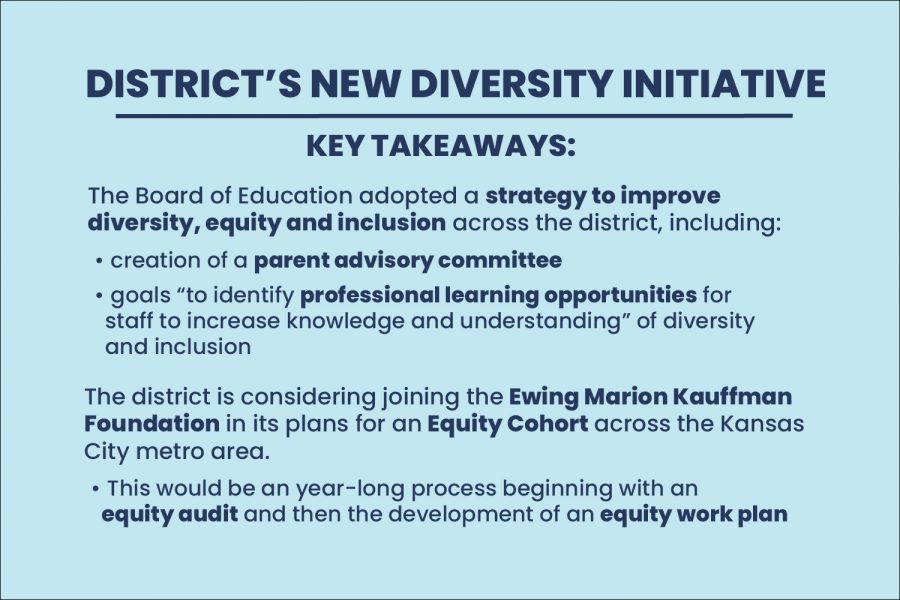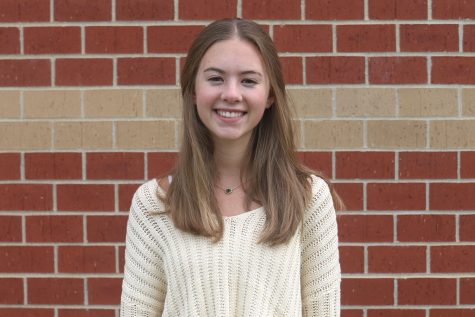Board of Education adopts initiative to improve diversity, equity and inclusion
The district is creating a parent advisory committee and considering entrance into a metro-wide Equity Cohort with the Ewing Marion Kauffman Foundation
In August, the Board of Education adopted an initiative to improve diversity, equity and inclusion across the district, creating a parent advisory committee and considering entrance into an Equity Cohort with the Ewing Marion Kauffman Foundation.
October 26, 2020
The USD 232 district has been looking into diversity and inclusion efforts since 2018 – these considerations are now turning into action.
In August, the Board of Education adopted a strategy to improve diversity, equity and inclusion (DEI) across the district, beginning with the creation of a parent advisory committee and possible entrance into a metro-wide Equity Cohort.
According to assistant superintendent Alvie Cater, a key component of this strategy is the parent advisory committee. The committee’s chief purpose will be to assist in developing DEI initiatives by offering insight into the community’s improvement areas.
The district is still in the process of inviting parents to join the committee, which will have representation from all 12 USD 232 schools.
The district is also considering an opportunity to join the Ewing Marion Kauffman Foundation in its plans for an Equity Cohort across the Kansas City metro area – which will be provided at no cost to a maximum of 10 school districts and local education agencies.
According to Cater, the Cohort would be a year-long process beginning with an equity audit and then the development of an equity work plan – a multi-year implementation of initiatives addressing the identified DEI priorities.
Cater notes that the parent advisory committee would play an integral role in this planning process by working with the community, developing plans for student and family engagement and providing perspective on district demographics.
The district will attend two more informational meetings with the Ewing Marion Kauffman Foundation in November and December and will make a decision by early January – the Cohort would officially launch in March.
“We hope that the information we gather in the coming weeks supports what we believe is a great program for us,” Cater said. “And it’s going to be methodical, and it’s going to take time.”
Regardless of the Equity Cohort, the district has its own DEI goals for the parent advisory committee to carry out, the chief being “to identify professional learning opportunities for staff to increase knowledge and understanding” of diversity and inclusion, according to Cater.
“Sometimes students are prepared to have difficult conversations, but it’s possible that some of our teachers may not be fully prepared or feel trained to engage in those conversations,” Cater said. “And so that’s where we want to start is with our staff, and then move forward by engaging our families and our students.”
Cater emphasizes that the district’s strategy will be a long-term, intensive process to improve DEI, not mere appeasement.
“We’re not looking for a couple of programs that may have a public-facing component to it and then everybody says, ‘Oh, that was great.’ We want to get beyond those types of things and truly do a multi-year effort to engage our families,” Cater said.
Reiterating the wide-spread opinion he has heard voiced across the district, Cater explains the motivation behind these diversity and inclusion goals.
“We have to cultivate equitable spaces in our schools where every student is seen, they feel supported, they feel loved and have a sense of belonging. And that is for every student, regardless of their background, regardless of their race or ethnicity,” Cater said. “And that’s truly what we need to get to… inclusiveness across the system.”













